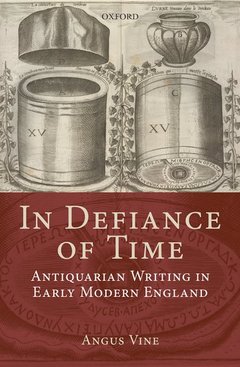Description
In Defiance of Time
Antiquarian Writing in Early Modern England
Author: Vine Angus
Language: English
Approximative price 173.95 €
In Print (Delivery period: 21 days).
Add to cart
Publication date: 06-2010
260 p. · 16.3x24.1 cm · Hardback
260 p. · 16.3x24.1 cm · Hardback
Description
/li>Contents
/li>Biography
/li>Comment
/li>
In Defiance of Time explores the emergence of antiquarianism in early modern England, from its first flourishing in the mid-Tudor period through to its seventeenth-century heyday. A vibrant antiquarian culture emerged, which reached beyond scholarly and historical circles, and had a profound influence on the literature and thought of the period. Examining the influences on that development of that culture, this book argues that the origins of English antiquarianism need to be found in the methods and practices of continental (and especially Italian) humanism. It shows that, like the humanists, the early antiquaries had the essentially imaginative aim of resurrecting and recomposing the past and past societies 'in defiance of time'. The antiquaries conceived of themselves and their activities as bridging the gap between past and present, affording 'olden time' presence in this way so that it might speak to and inform present circumstances. At the heart of this book is the argument that the antiquarian project depended on the antiquaries' capacity to restore-in their imagination at least-the fragments of the past, to imagine those remnants of history 'which have casually escaped the shipwrack of time' made whole once again. In Defiance of Time traces these arguments through a range of authors and material, both printed and in manuscript. Chapters advance original readings of important authors such as Leland, Stow, Spenser, Camden, Drayton, and Selden, as well as shedding light on institutions such as the Elizabethan Society of Antiquaries and reviewing the wide range of activities, interests, and concerns that came under the antiquarian purview. Antiquarianism is thereby shown to be integral to early modern literary and intellectual culture.
List of illustrations. List of abbreviations. Note on text. Introduction. 1. Material Beginnings: John Leland, John Twyne, John Stow. 2. Origins and Names: Etymology and the Elizabethan Society of Antiquaries. 3. Restoring Britain: Courtesy and Collaboration in Camden's Britannia. 4. Monuments and Megaliths: From Stonehenge to 'Stonage'. 5. A Peripatetic Education: Antiquarian Travellers and the Apodemic Arts. 6. Antiquarian Readers: The Case of Drayton and Selden. Conclusion. Appendix. Bibliography. Index.
Angus Vine is Lecturer in Early Modern Literature at the University of Sussex. He completed his PhD at Trinity College, Cambridge, and he works on the literature and intellectual history of sixteenth- and seventeenth-century England, with elated research interests in the history of science, the history of the book and manuscript culture. With Dr Richard Serjeantson (University of Cambridge) he is editing The Oxford Francis Bacon, Volume III: Earlier Jacobean Writings, 1603-1613.
The spell Sebald currently casts over contemporary literature suggests that the antiquarian imagination Angus Vine so successfully redeems will continue quietly to inform our present.
© 2024 LAVOISIER S.A.S.




